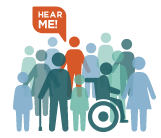
MEASURE ADAPTATIONS: INTELLECTUAL DISABILITY AND SELF-REPORT
Study Lead: Jill Hollway, PhD
Plain Language: https://www.rrtcnisonger.org/clear-language/
Summary
Individuals with IDD are at high-risk for mental health problems (USODPHP, 2018; Summers, Fletcher & Bradley, 2017; Hithersay et al., 2014; Hassiotis & Turk, 2012; Drum et al., 2009). In fact, mental health problems occur in up to 40% of adults with intellectual and developmental disabilities (ID/DD). (Cooper et al., 2007). Recognizing, assessing, and diagnosing mental health problems in people with ID/DD is challenging and may be limited by verbal or cognitive abilities (Hellings & Boss, 2017). The health care needs of this population are often unrecognized and unmet due to limitations in their ability to self-report conditions or symptoms of mental distress (Summers, Fletcher & Bradley, 2017; Hassiotis & Turk, 2012). The diagnostic process for this population has relied heavily on proxy reports, but research suggests that even proxies who know the individual with ID/DD well (e.g., family, guardians, support staff) struggle to identify mental health symptoms (Schutzwohl et al., 2017; Hassiotis & Turk, 2012). Accurate assessments and diagnoses of mental health problems may lead to effective interventions and treatments and inform preventative health care protocols. Therefore, there is an urgent need to develop cognitively accessible tools which will allow individuals with ID/DD to self-report conditions or symptoms of mental distress.
The RRTC on health and function has identified three key areas of need regarding development and validation of cognitively accessible instruments: a) mental health, b) health-related quality of life (HRQL), and c) physical health. This project will work to adapt and validate cognitively accessible self-report measures in each of these three areas. The measures will be adapted in collaboration with our Disability Experiences Expert Panel, who will give input on the cognitive accessibility of the measures, as well as strategies they see to increase self-report in the ID/DD population.
Methodology
Sample
We will recruit a sample of 62 adult with ID/DD (18+ years of age) and caregiver dyads (N = 124 individual study participants). In order to evaluate measure sensitivity, half of the adults with ID/DD participating in the study will also have a co-occurring mental health concern or diagnosis (referred to as dual diagnosis).
Procedure
The three measures we will adapt for adults with intellectual and developemental disabilities are as follows:
- The currently in-development Psychiatric Diagnostic Interview for Adolescents with Intellectual Disabilities (PDI-AID) which is based on the Diagnostic Interview Schedule for Children – Fourth Edition (DISC-IV);
- The established Function Neutral Health-Related Quality of Life (FuNHRQL) self-report survey; and
- The Patient Reported Outcomes Measurement Information System (PROMIS) Profile self-report survey.
The modification needs of the three measures will be assessed through an initial pilot with 12 adults with ID/DD and their caregiver/support persons. Once the initial pilot testing is complete and further adaptations are made, a validity and reliability study will be completed for all three measures to establish preliminary psychometrics on the adapted measures. All three measures will be administered twice to the same 50 adults with ID/DD and their caregivers to establish test-retest reliability. In order to evaluate measure sensitivity for the PDI-AID (diagnostic interview), half of the adults with ID/DD will also have a co-occurring mental health concern or diagnosis (referred to as dual diagnosis).
Additionally, the Wechsler Abbreviated Scale of Intelligence (WASI-2), a standardized measure for persons with ID/DD, will be administered to the adult with IDD. The Adaptive Behavior Assessment System (ABAS 3) will be administered to the caregiver. These two measures will be used to assess levels of functioning in participants and to confirm an IQ of <70. In instances when the adult with ID/DD is 40+ years old, a Proxy Neurocognitive Disorders Screening questionnaire – which has been developed as part of the PDI-AID – will be administered.
Internal Validity
Blind condition: In order to reduce the potential of interviewer bias and increase internal validity of the study, a blind condition will be implemented during the validity and reliability study. Participants will be assigned a unique code that indicates whether the adult with ID/DD has a co-occurring mental health concern or diagnosis. This information will not be shared with those conducting the interviews and administering measures. Thus, the interviewer will be blind to the mental health status of the adult with ID/DD, thereby helping to control any bias in measure administration. Implementation of a blind condition will help determine sensitivity of the PDI-AID as a mental health diagnostic interview.
Interviewer training and reliability: Interviewers must participate in at least a 1.5 day interviewer training session which will include the following: a) project orientation, b) procedures for administering the PDI-AID, FuNHRQL, and PROMIS measures, Demographic Survey, and Proxy Neurocognitive Disorders Screening Questionnaire and recording study participant responses into REDCap, c) procedures for administering the standardized WASI-2 and ABAS-3 measures on paper, d) crisis management training, and e) the process of informed consent and effective communication strategies in working with adults with ID/DD in order to encourage their self-report as well as advocacy in health research.
Expected Outcome
The expected outcomes of the measure adaptations study include a state-of-the art contribution of much needed self-report measures to more accurately diagnose mental and behavioral health concerns among adults with ID/DD and evaluate their health related quality of life and health function, in order to improve the quality of health services and research. Being able to accurately and reliably identify the presence of a mental health diagnosis is the first step towards getting appropriate care, services, and supports, as well as avoiding ineffective interventions and treatments.
See Study 2: Prevalence Study – Intellectual Disability and Mental Illness
See Study 3: Clinical Guidelines – Intellectual Disability and Psychotherapy

